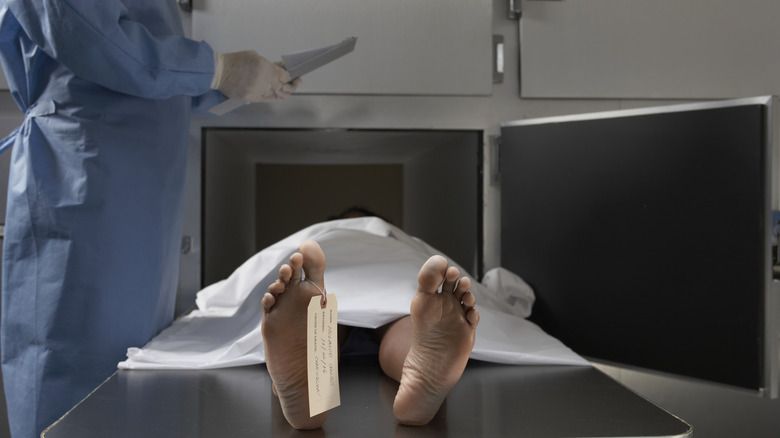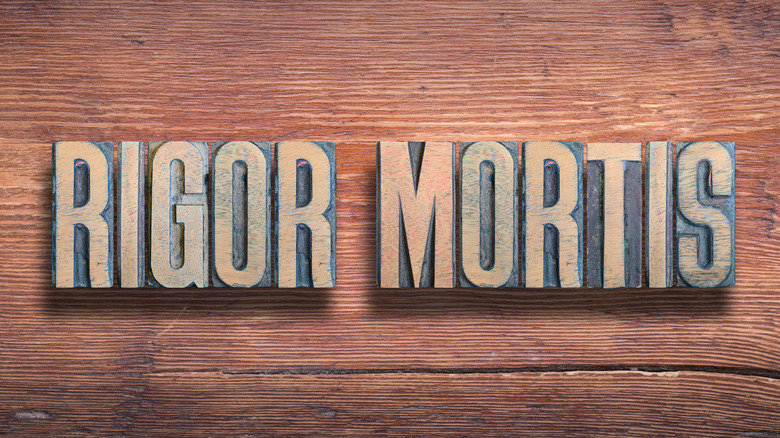Is It Possible To Die While Standing Up?
Whether it's something you saw on TV or a story you heard from someone that sparked your curiosity, it's natural to wonder about the lesser-known facts about death. What happens to your body when you die? Can you die while standing up?
The latter question, we assume, would have been a topic of conversation when the Hillsborough disaster occurred on April 15, 1989. Considered the U.K.'s worst sports disaster, the incident happened at an overcrowded stadium — the Hillsborough Football Stadium in Sheffield, England. 97 Liverpool supporters were crushed to death — some smashed against metal barricades, others trampled on, and some suffocated.
While it might be safe to think that some of these people would have died while standing up, is there science behind whether this could happen? Not really. But there are more news reports of incidents involving people who've met their end while in an upright position.
Other instances when someone died while standing up
A 35-year-old man, Andrew Evans, whose death the coroner had described as "bizarre," was found dead standing in his East Grinstead, West Sussex home with his hand in a kitchen cupboard. He was reported to be intoxicated at the time of his death.
Found that way by a friend, Evans was believed to have suffered a head injury and blacked out while in the kitchen. His body remained in the standing position because it was being supported by some kitchen fittings. The coroner, Dr. David Skipp shared (via Daily Mail), "It is unusual for a man whose alcohol levels were high to be found stood against a work surface. He obviously did not try to get out of the flat after banging his head and the evidence suggests he was not bothered by what was going on — It is bizarre."
Yet another death was reported in Edmonton, Canada, of an 18-year-old boy who died after having stood up through the sunroof of a sedan and hitting his head on a concrete beam in a mall parking garage. However, the news reports said he succumbed to his injuries while at the hospital. While incidents of this nature may point toward the possibility of dying while standing up, the knowledge of what happens to your body after death could make you question whether someone can remain standing after they've passed away.
Rigor mortis might prevent someone from staying upright after death
Rigor mortis is one of the bodily changes that happen after someone dies, typically about two hours after someone's death. But it can go on for up to two days, per Medicine Net. Rigor mortis precedes what happens to your skin just after death.
Even if someone may have died while standing up, there's a good chance that their body might fall over and rest against something or simply fall to the ground in the absence of anything to hold it upright because of what happens during rigor mortis. There are six stages of rigor mortis — absent, minimal, moderate, advanced, complete, and passed and during these stages, the muscles go from being soft and movable to gradual and complete stiffening until putrefaction happens when the body goes through what's known as the secondary relaxation. After death, your brain isn't sending signals to your muscles or any other organs like it used to. This results in a lack of the nucleotide adenosine triphosphate (ATP) that gives your muscles energy to function, which is what leads to rigor mortis.
Remaining standing after death might also be difficult with what science has uncovered about how our bodies might move a little after dying. Alyson Wilson of Central Queensland University in Rockhampton and her team have found that the body might be restless and shift positions after death. "We think the movements relate to the process of decomposition, as the body mummifies and the ligaments dry out," explained Wilson (via Medical News Today).



